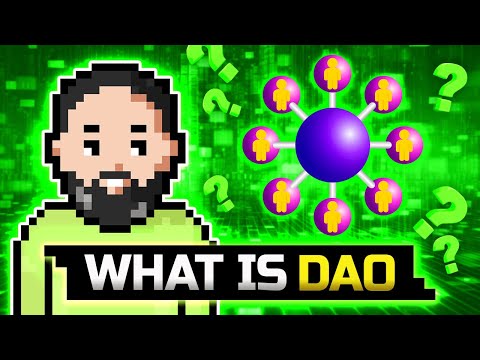
title
Understanding Different Types of DAOs: The Complete Guide
As decentralized technologies continue to reshape traditional industries, **Decentralized Autonomous Organizations (DAOs)** are gaining traction as innovative organizational structures. DAOs enable groups of people to pool resources, collaborate, and make decisions transparently and democratically. There are several types of DAOs, each serving different purposes, and understanding their roles is essential for anyone looking to explore or join the Web3 space.
In this article, we’ll cover what DAOs are, the unique forms they take, and how each type functions to address specific needs. Whether you’re interested in **investment DAOs** for pooling funds, **social DAOs** for community building, **service DAOs** for specialized tasks, **governance DAOs** for decision-making, or **protocol DAOs** for technical development, this guide will provide valuable insights into each of these dynamic types.
What is a DAO?
A **DAO** is a digital, self-governing organization that operates without central authority. These organizations are built on **blockchain technology**, enabling members to make decisions collectively. Unlike traditional organizations, DAOs are governed by smart contracts – self-executing contracts coded into the blockchain that enforce rules and manage operations. This decentralized approach allows DAOs to operate in a transparent, trustless environment, where participants can vote on proposals, allocate resources, and participate in decision-making.
How Do DAOs Work?
DAOs leverage **smart contracts** to automate and streamline processes. Each member holds tokens representing their voting power within the organization. When a proposal is submitted, members use their tokens to cast votes. If a majority consensus is reached, the smart contract is executed, implementing the decision. This setup minimizes the need for human intervention, reducing costs, and preventing tampering or corruption.
Now, let’s dive into the five primary types of DAOs and explore how each functions to address various needs.
1. Investment DAOs: Pooling Resources for Financial Growth
**Investment DAOs** enable participants to pool their funds to invest in assets collectively. These DAOs democratize investment opportunities, allowing individuals to participate in ventures that may have been inaccessible previously.
How Investment DAOs Work
Investment DAOs gather funds from their members, who then vote on how to allocate resources. Through smart contracts, investment decisions are enforced transparently. Investment DAOs can focus on various assets, such as cryptocurrencies, NFTs, startups, and even real-world assets. By pooling resources, members gain access to a diversified portfolio and can share profits.
Key Benefits of Investment DAOs
– **Accessibility:** Allows smaller investors to participate in large-scale projects.
– **Transparency:** Every transaction is recorded on the blockchain, ensuring full visibility.
– **Collective Decision-Making:** Members have a say in every investment decision.
2. Social DAOs: Building Communities and Supporting Causes
**Social DAOs** are focused on **community-building** and often revolve around shared values or interests. They provide a decentralized space where like-minded individuals can come together, interact, and collaborate.
How Social DAOs Work
Social DAOs typically operate on social platforms or metaverses, creating spaces where members can interact freely. Many social DAOs support charitable causes, raise awareness on specific issues, or foster specific communities. Membership often requires holding a unique NFT or token, which grants access to private channels, events, and decision-making processes.
Key Benefits of Social DAOs
– **Community Engagement:** Unites people with similar interests and goals.
– **Collective Impact:** Can create meaningful change through member contributions.
– **Unique Access:** Provides members with exclusive access to events, information, or perks.
3. Service DAOs: Delivering Specialized Services
**Service DAOs** are designed to provide specialized services, often for other DAOs or blockchain projects. These DAOs are essentially decentralized marketplaces where skilled individuals offer services such as development, design, content creation, and event organization.
How Service DAOs Work
Service DAOs work by connecting members who offer services with DAOs or projects in need of specific expertise. Members pool their skills, and tasks are typically assigned through a voting or bidding system. In return, they receive compensation in the form of tokens or cryptocurrency.
Key Benefits of Service DAOs
– **Decentralized Marketplace:** Brings together service providers and clients within a secure environment.
– **Efficiency:** Streamlines service offerings without intermediaries.
– **Skill Development:** Allows members to contribute and grow within their fields.
4. Governance DAOs: Managing Rules and Decisions
**Governance DAOs** focus on decision-making within an organization. These DAOs empower token holders with voting rights to create, amend, and enforce rules and policies.
How Governance DAOs Work
Governance DAOs operate through governance tokens, where each token represents a vote. Members vote on important matters, such as protocol changes, funding allocations, or partnerships. In essence, governance DAOs are responsible for defining and maintaining the internal framework of a decentralized organization.
Key Benefits of Governance DAOs
– **Democratic Decision-Making:** Ensures all stakeholders have a say in governance.
– **Transparency:** Records every decision on the blockchain for accountability.
– **Adaptability:** Allows organizations to evolve with input from a diverse group.
5. Protocol DAOs: Developing and Maintaining Technical Standards
**Protocol DAOs** are primarily technology-focused, responsible for developing and maintaining blockchain protocols and standards. These DAOs ensure that protocols remain secure, scalable, and aligned with community needs.
How Protocol DAOs Work
Protocol DAOs manage the development and updates of decentralized applications (dApps) and blockchain protocols. Members propose changes, and token holders vote on implementations. Protocol DAOs may also offer grants to developers working on the ecosystem, encouraging innovation.
Key Benefits of Protocol DAOs
– **Continuous Improvement:** Regular updates and upgrades ensure protocol relevance.
– **Security and Scalability:** Decentralized oversight strengthens security and enables sustainable growth.
– **Developer Incentives:** Grants and rewards attract skilled developers, fostering innovation.
The Rise of Multi-Role DAOs
In addition to these five core types, many DAOs are evolving to combine multiple roles. These **hybrid DAOs** integrate aspects of investment, service, social, and governance DAOs to create versatile organizations capable of addressing multiple needs. Hybrid DAOs are becoming increasingly popular as they offer greater flexibility and adaptability.
Legal and Regulatory Challenges for DAOs
Despite their potential, DAOs face regulatory uncertainties. Since DAOs operate without a central authority, defining their legal status can be challenging. Regulatory bodies across different countries are exploring ways to classify DAOs, but until comprehensive frameworks are established, many DAOs remain in a legal gray area.
Addressing Compliance
To mitigate regulatory risks, some DAOs are adopting **legal wrappers**, creating formal structures in jurisdictions that recognize DAOs. This allows them to operate within the law while retaining their decentralized governance model.
Advantages and Disadvantages of Joining a DAO
Advantages
– **Democratization of Access:** DAOs allow anyone to participate, regardless of location or financial status.
– **Transparency and Security:** Blockchain’s inherent transparency ensures that all activities are trackable.
– **Efficiency and Automation:** Smart contracts eliminate the need for intermediaries, streamlining operations.
Disadvantages
– **Regulatory Risks:** The lack of clear regulations can pose risks for members.
– **Technical Requirements:** Members need a certain level of technical knowledge to navigate the DAO space.
– **Coordination Challenges:** Reaching consensus in large DAOs can be time-consuming.
How to Join a DAO
Joining a DAO is relatively straightforward. Most DAOs require potential members to acquire a **governance token** or an NFT to gain entry. Here’s a quick step-by-step guide:
1. **Research:** Identify DAOs that align with your interests.
2. **Acquire Tokens:** Purchase or earn the governance tokens required for membership.
3. **Engage in Governance:** Start voting, participating in discussions, and contributing to projects.
4. **Stay Informed:** Follow the DAO’s updates, stay active in the community, and contribute where you can.
Conclusion
DAOs are revolutionizing how we think about organizations by enabling decentralized, democratic, and transparent governance models. From **investment DAOs** focused on pooled assets to **protocol DAOs** shaping technical standards, DAOs are versatile structures that offer unique benefits across various sectors. However, while DAOs bring exciting opportunities for democratizing access and decentralizing control, they also come with challenges, particularly around regulation and coordination.
As DAOs evolve, they are likely to transform industries by fostering collaboration and decentralization, setting the stage for a new era of digital community and governance. Whether you’re looking to invest, join a community, offer services, or engage in governance, there’s a DAO tailored to meet your needs, making now an exciting time to explore the world of DAOs.
Ready to join the Musk Empire? Believe in the project? 🤔 Join now







 Bengali
Bengali Chinese (Simplified)
Chinese (Simplified) English
English Hindi
Hindi Indonesian
Indonesian Irish
Irish Spanish
Spanish Swedish
Swedish Turkish
Turkish